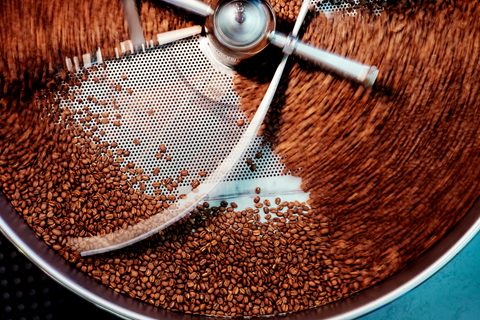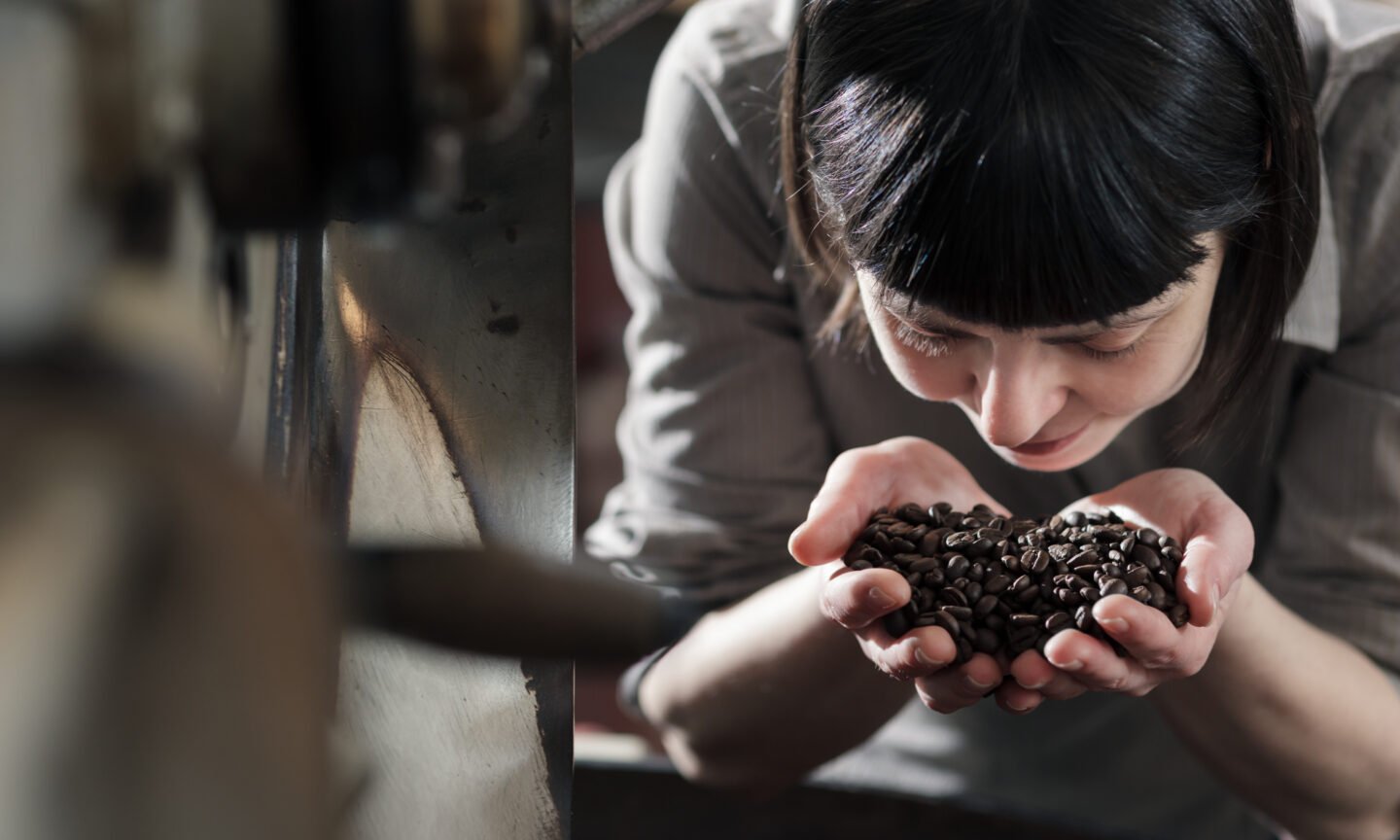Bad news, coffee drinkers: According to the latest inflation report, the average retail price of roasted coffee has risen 14.8% since last July.
Worse news: Some of President Donald Trump’s highest new tariffs started this month and are throwing the coffee supply chain into disarray. They appear destined to send prices of America’s go-to beverage even higher in the months ahead.
High-quality coffee beans are grown in a few key countries, virtually all of which are subject to new tariffs. Brazil is by far the biggest, supplying 37% of global production last year, and it was hit with a blanket 50% tariff that took full effect Aug. 6.
Bean prices are jumping
Brazil’s high-quality arabica beans form the base of many popular specialty blends. Industry sources we spoke to say that a 50% price hike is likely too much for roasters and consumers to swallow, with importers and roasters alike wondering how to respond.
“I can tell you from conversations with some customers, there’s not an appetite to purchase large volumes of Brazilian coffee with a new 50% tariff,” says Peter Radosevich, a trader and international sales team leader for specialty importers Royal Coffee, based in Oakland, Calif.
“One of Brazil’s greatest selling points, because it’s one of the largest producers, has been its price point. And so when you remove that from the equation, I think people will move away from using it for sure.”
Which raises the question of how to find a replacement in a finite market where virtually every viable bean grown already finds its way into a cup somewhere in the world.
“Right now, roasters in the U.S. are scrambling to figure out, with the Brazil tariffs, what they’re going to replace it with,” says Spencer Turer, vice president of Coffee Enterprises, a Vermont-based company that provides consulting and product testing to the coffee trade.
“Or, they’re just going to have to absorb the costs and either reduce their profitability or pass those prices on to the consumer.”
Tariffs ranging from 10% to 50% are now in place on imports from almost every coffee-producing country.
The lone exception is Mexico, where coffee is covered by the pre-existing U.S.-Mexico-Canada Agreement (USMCA). But according to both Radosevich and Turer, prices are rising there even without tariffs — driven by high demand as buyers crowd in to buy up available beans.
Before those beans can become a cup of joe — whether you make your coffee at home or pick up a cup from a cafe — they have to be roasted. So where does the current market turmoil leave roasters, of which there are thousands in the U.S., large and small?
“Intellectually, I would look at where the harvest cycles are, where coffee is fresh, what’s going to taste similar,” says Turer. “But once you make that conclusion, you have to realize that there are hundreds of roasters that have probably reached that conclusion before you, and already made those phone calls to the importers.”
Why tariffs on coffee?
Fair question. A traditional rationale for tariffs, and one that Trump cites, is to defend a domestic industry. But coffee, as an agricultural product, is not climactically suited for the contiguous United States. It is produced on only a miniscule scale (by global standards) in Hawaii and Puerto Rico, with some fledgling efforts in California.
Coffee is, essentially, collateral damage in Trump’s push to reshape global trade.
Until the day Brazil’s tariffs went into effect, there were hopes that coffee would get an exemption, and the co-chairs of the bipartisan Congressional Coffee Caucus (yes, there’s a Congressional Coffee Caucus) sent a letter to the administration in late July urging that unroasted coffee be exempted from all tariffs.
“Unlike many other goods affected by recent tariffs, coffee is not produced at a scale within the United States that can meet domestic demand,” stated the letter, signed by U.S. Reps. Jill Tokuda, D-HI, and William Timmons, R-S.C., co-chairs of the caucus.
“Every $1 of imported coffee creates an estimated $43 in value throughout the supply chain, and coffee shops, roasters, and distributors serve as important economic engines supporting small businesses and creating jobs that help sustain local economies.”
Hopes for a coffee exemption haven’t panned out, effectively keeping the industry in paralysis. An exemption could still come in an environment where fresh tariffs announcements are made almost daily, but roasters no longer have the luxury of waiting.
The coffee supply chain: a thumbnail sketch
It’s a long road from a coffee farm to your cup.
Coffee producers around the world can range from large plantations to small family-run operations, as well as cooperative farms. After harvest, the green beans — the seed of a coffee tree “cherry” — can be dried and processed (by one of several methods) at the farm or at a shared facility before being bagged for export.
Like other commodities, the baseline price of coffee is set by a futures market that is largely populated by traders who may never take possession of a bag of beans.
Factors in the futures price of coffee can range from on-the-ground conditions, like weather patterns and crop yields, to technical factors, like the price of oil, interest rates and the strength of the U.S. dollar.
Back-to-back droughts in Brazil have caused prices to spike in recent years, for example.
“Coffee has always been stated as one of the most volatile commodity prices in, basically, the world,” Turer says. “And it moves pretty aggressively day to day, month to month, week to week, and it goes up, it goes down, it changes, sometimes it goes beyond logic.”
And because there is such a spectrum in the quality of unroasted beans, most are bought and sold at a differential to the commodity price. Lower-quality beans sell for less while desirable varietals sell for more — sometimes much more.
The most sought-after beans in the specialty market tend to be grown at higher elevation, in places such as Colombia and Ethiopia. Those beans can be roasted and marketed as single-origin coffees or used in blends.
Enter the importers, more than 7,000 of whom operate in the United States, who often build close relationships with producers large and small all over the world.
Radosevich’s company, Royal Coffee, imports from more than 30 countries, ranging from Indonesia to South America.

“It’s a weekly exercise in trying to figure out how to maintain both a good supply of coffee for our customers at a good price and also maintain relationships with suppliers,” Radosevich says.
“I mean, we want to honor every contract we’ve written, so we’re going to do that. But going forward, it is hard to make the same commitments that we’ve made. You know, for purchasing this year without knowing where these tariff levels may be.”
Importers are tasked with getting the beans, typically packaged in 60-kilogram sacks, to market in the U.S. That’s when general disruptions in global shipping further complicate the picture.
“Not just coffee, but all transporters, all freight companies, are kind of reshuffling where they’re sending ships. That’s just kind of in constant flux,” says David Yake, director of sales and sustainability for Tony’s Coffee, a roaster based in Bellingham, Wash. “It feels COVID-reminiscent. It’s not as bad as COVID, but it’s definitely returning to a higher level of unpredictability.”
Once they’re able to secure their supply, importers sell to roasters in the United States (and elsewhere), sometimes on advance contracts and sometimes on a spot basis. Estimates vary, but there are at least several thousand independent roasters in the U.S.
Some of the players, like Starbucks and Keurig, are mammoth and have scale on their side, while smaller roasters are scrambling to secure their supplies at a price they can afford. Tariffs are tacked onto the price roasters pay, even if they have a pre-tariff contract, and some or all of that will be passed on to the coffee drinker.
“The tariffs are being paid by U.S. small businesses,” says Yake. “This notion that they are being paid by the producing country is not true. We see the tariffs on our invoices that we pay every month.”

Tony’s is not dependent on Brazilian coffee, but the company had already been grappling with the general 10% baseline tariffs that have been in place for months, as well as overall escalation in coffee prices over the past two years.
“Drought, climate change, have had a real impact on coffee supply and stocks globally. These were all pre-tariff concerns,” Yakes says. “Our sales have definitely suffered. We do a lot of our distribution through grocery channels, and I think consumers are already shopping sales. We have very loyal customers but I think brand loyalty only goes so far when you’re seeing double-digit price increases.”
Chuck Nigash runs a boutique specialty roaster called Elevated Roast in Bainbridge Island, Wash., that sells directly to a core of steady customers. He’s trying to keep his lineup of offerings — and his prices — as stable as possible while adjusting to the changing coffee landscape.
“I figured out that my own tariff costs are roughly 21%,” he says.
“I’m intentionally eating half of that, because I don’t want the customer to eat that,” he adds — but he runs such a small operation that he’s able to do that while still making a margin he can live with. Not all roasters, especially those with debt or tighter margins, have as much flexibility.
“So, when a supply chain as complicated as coffee starts to get disrupted on political issues, on U.S. currency issues, on tariff issues,” it can be destabilizing for roasters, Turer says. “This causes all kinds of consternation, all kinds of financial stress, and with the interest [rates] pricing up, there are companies that may potentially close, because they don’t have the availability for credit, and they don’t have the profitability to stay functioning with their cost of goods going up.”
Where will Brazil’s coffee go?
If U.S. importers buy significantly less Brazilian coffee while tariffs are in place, which seems probable, other coffee-consuming countries will undoubtedly step up.
For instance, while the United States is the single biggest coffee consumer in the world, the European Union collectively drinks more coffee — and already imports about a third of it from Brazil.
And then there’s China. The same week that the U.S. tariffs on Brazil were made official, China authorized 183 Brazilian coffee companies to export into the country.
Coffee consumption is on the rise in China, but the move is largely seen as a soft-power play to build political capital with the biggest South American economy while its trading and political relationship with the United States founders.
“There’s a saying we have in the coffee industry,” Turer says. “All coffee will find a home.”
And what will coffee drinkers do?
An April 2025 survey by the National Coffee Association found that 66% of American adults drink coffee every day, surpassing the consumption of tea, juice, soda and bottled water. The popularity of more expensive specialty coffees has risen 18% since the same survey was last conducted in 2020.
The way Americans consume their coffee varies of course, from a macchiato at Starbucks to a pot of home brew courtesy of Mr. Coffee. The survey found that 71% of past-day drinkers made at least one cup at home, 16% had coffee prepared out of home only, and 13% had coffee prepared both in and out of home.
Those who make coffee at home overwhelmingly bought their supplies at grocery stores, big-box stores and club stores.
As prices rise, consumers will have to decide whether to absorb the additional cost or make a money-saving adjustment — drinking less coffee, switching to cheaper brands, drinking coffee away from home less often, or some combination of the above.
“People can change their consumption, right? If they want to make sure they get their cup of coffee in the morning, there’s different ways to get that cup of coffee,” says Turer.
Coffee being coffee, though, a change in habits is not always easy.
“It’s a ritualistic product,” says Turer, “which means the consumer expects the coffee to look, smell and taste the same way every time.”


























